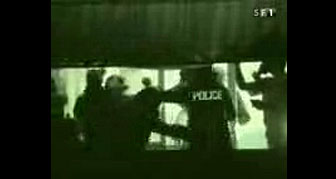
Questions remain over police behaviour during immigrant death

A Turkish man who died following his arrest by Swiss police last week succumbed to the effects of a cardiac arrest, according to the preliminary findings of an investigation into the case.
Investigators who presented the findings on Wednesday said it was “extremely likely” that “Cemal D.”, a 42-year-old Turkish immigrant, died as a result of the “events” which took place before his arrest.
His death made headlines in Switzerland and led to allegations that police used excessive force when they subdued him in his apartment after a three-hour stand-off.
Investigators refused to comment at this stage whether the police action had been excessive. The question is still being examined.
Television stations across Switzerland this week broadcast amateur video footage which showed officers belonging to an elite police unit in the Swiss capital, Bern, repeatedly beating D. with truncheons before dragging him from his balcony. He died three days later.
The footage, shot by neighbours in an adjoining block of flats, brought back memories of an amateur video showing the beating of a black man called Rodney King by Los Angeles police officers in 1991.
The tragic events unfolded on the evening of July 4 when neighbours, who said they were alarmed by a family row in Cemal D.’s flat, called the police. When officers arrived on the scene, D. was threatening his wife and three children with a knife, which he later turned on officers, who tried to arrest him after bringing his other family members into safety.
Throughout the past week, family of the deceased and “augenauf” (open your eyes), a militant group that advocates solidarity with immigrants and asylum seekers, have been staging street protests. Amnesty International has also voiced its concern and demanded an independent investigation.
Ulrich Zollinger, the head of the Bern institute of forensic pathology and a leading member of the investigation, said on Wednesday that Cemal D. could not have died from the repeated beatings he received from police officers. “His skull, brain [and] his inner organs weren’t injured,” Zollinger concluded.
But the magistrate leading the investigation, Stephan Neuhaus, also revealed that D. was injected with a “normal dose” of a sedative by a medic after he had been dragged inside his flat. At that point, D. had “still been vehemently resisting police officers”, Neuhaus told journalists.
The exact cause of D.’s cardiac arrest is still under investigation. According to Zollinger, it could be one or a combination of several factors – stress, sedatives, teargas and other chemicals used during the arrest, and a chronic disease of the victim’s coronary vessels.
“What is clear is that [Cemal D.’s] brain suffered from a loss of oxygen [as a result of the cardiac arrest] and was irrevocably damaged,” Zollinger said.
D., who was also suffering from a psychiatric illness, never regained consciousness, and died in hospital on July 7.
Marcel Niggli, a professor of criminal law at Fribourg university, told swissinfo that the crucial question of proportionality remained. “The police used force, and whether this was proportionate doesn’t depend on whether the man died of the beatings or not,” Niggli said.
Commenting on criticism raised by some media, Niggli said the police were on firm ground legally in subduing and arresting Cemal D. even after he was no longer a threat to his wife and children.
“But whether it would have been more reasonable to just leave and wait until the man had calmed down – that’s another question.”
Niggli thinks a root cause of the tragic events lies in the insufficient training facilities of police officers in Switzerland. “Police matters are in the competence of the cantons, which means that cases like these are too rare and police forces too small to have specialised units.”
Niggli also questions whether the inquiry, led by the administration of canton Bern into the behaviour of the Bern city police, fulfils the requirements of an independent investigation.
“Legally, the two administrations are separate, but seen from the outside it must be assumed that officers in the two forces know each other,” Niggli says.
“It would be better if the on-going investigation was led by an unambiguously external institution, say by investigators from Zurich or Basel,” Niggli says.
by Markus Haefliger

In compliance with the JTI standards
More: SWI swissinfo.ch certified by the Journalism Trust Initiative





























You can find an overview of ongoing debates with our journalists here . Please join us!
If you want to start a conversation about a topic raised in this article or want to report factual errors, email us at english@swissinfo.ch.